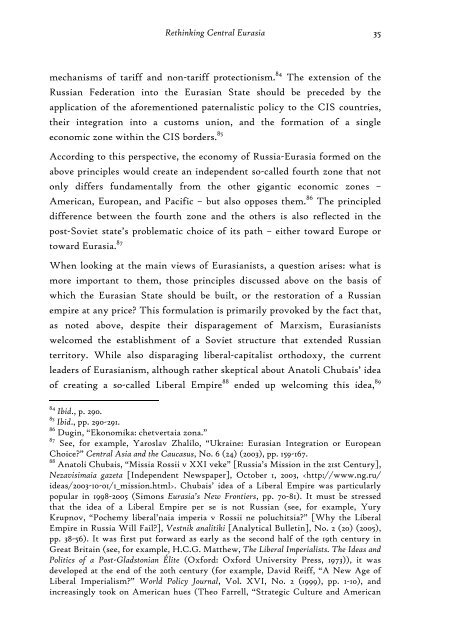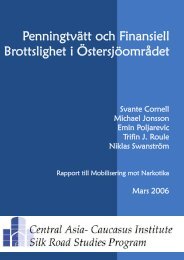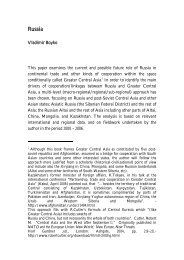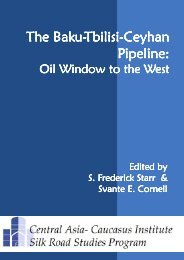Eurasianism and the Concept of Central Caucaso-Asia
Eurasianism and the Concept of Central Caucaso-Asia
Eurasianism and the Concept of Central Caucaso-Asia
You also want an ePaper? Increase the reach of your titles
YUMPU automatically turns print PDFs into web optimized ePapers that Google loves.
Rethinking <strong>Central</strong> Eurasia 35<br />
mechanisms <strong>of</strong> tariff <strong>and</strong> non-tariff protectionism. 84 The extension <strong>of</strong> <strong>the</strong><br />
Russian Federation into <strong>the</strong> Eurasian State should be preceded by <strong>the</strong><br />
application <strong>of</strong> <strong>the</strong> aforementioned paternalistic policy to <strong>the</strong> CIS countries,<br />
<strong>the</strong>ir integration into a customs union, <strong>and</strong> <strong>the</strong> formation <strong>of</strong> a single<br />
economic zone within <strong>the</strong> CIS borders. 85<br />
According to this perspective, <strong>the</strong> economy <strong>of</strong> Russia-Eurasia formed on <strong>the</strong><br />
above principles would create an independent so-called fourth zone that not<br />
only differs fundamentally from <strong>the</strong> o<strong>the</strong>r gigantic economic zones –<br />
American, European, <strong>and</strong> Pacific – but also opposes <strong>the</strong>m. 86 The principled<br />
difference between <strong>the</strong> fourth zone <strong>and</strong> <strong>the</strong> o<strong>the</strong>rs is also reflected in <strong>the</strong><br />
post-Soviet state’s problematic choice <strong>of</strong> its path – ei<strong>the</strong>r toward Europe or<br />
toward Eurasia. 87<br />
When looking at <strong>the</strong> main views <strong>of</strong> Eurasianists, a question arises: what is<br />
more important to <strong>the</strong>m, those principles discussed above on <strong>the</strong> basis <strong>of</strong><br />
which <strong>the</strong> Eurasian State should be built, or <strong>the</strong> restoration <strong>of</strong> a Russian<br />
empire at any price? This formulation is primarily provoked by <strong>the</strong> fact that,<br />
as noted above, despite <strong>the</strong>ir disparagement <strong>of</strong> Marxism, Eurasianists<br />
welcomed <strong>the</strong> establishment <strong>of</strong> a Soviet structure that extended Russian<br />
territory. While also disparaging liberal-capitalist orthodoxy, <strong>the</strong> current<br />
leaders <strong>of</strong> <strong>Eurasianism</strong>, although ra<strong>the</strong>r skeptical about Anatoli Chubais’ idea<br />
<strong>of</strong> creating a so-called Liberal Empire 88 ended up welcoming this idea, 89<br />
84 Ibid., p. 290.<br />
85 Ibid., pp. 290-291.<br />
86 Dugin, “Ekonomika: chetvertaia zona.”<br />
87 See, for example, Yaroslav Zhalilo, “Ukraine: Eurasian Integration or European<br />
Choice?” <strong>Central</strong> <strong>Asia</strong> <strong>and</strong> <strong>the</strong> Caucasus, No. 6 (24) (2003), pp. 159-167.<br />
88 Anatoli Chubais, “Missia Rossii v XXI veke” [Russia’s Mission in <strong>the</strong> 21st Century],<br />
Nezavisimaia gazeta [Independent Newspaper], October 1, 2003, . Chubais’ idea <strong>of</strong> a Liberal Empire was particularly<br />
popular in 1998-2005 (Simons Eurasia’s New Frontiers, pp. 70-81). It must be stressed<br />
that <strong>the</strong> idea <strong>of</strong> a Liberal Empire per se is not Russian (see, for example, Yury<br />
Krupnov, “Pochemy liberal’naia imperia v Rossii ne poluchitsia?” [Why <strong>the</strong> Liberal<br />
Empire in Russia Will Fail?], Vestnik analitiki [Analytical Bulletin], No. 2 (20) (2005),<br />
pp. 38-56). It was first put forward as early as <strong>the</strong> second half <strong>of</strong> <strong>the</strong> 19th century in<br />
Great Britain (see, for example, H.C.G. Mat<strong>the</strong>w, The Liberal Imperialists. The Ideas <strong>and</strong><br />
Politics <strong>of</strong> a Post-Gladstonian Élite (Oxford: Oxford University Press, 1973)), it was<br />
developed at <strong>the</strong> end <strong>of</strong> <strong>the</strong> 20th century (for example, David Reiff, “A New Age <strong>of</strong><br />
Liberal Imperialism?” World Policy Journal, Vol. XVI, No. 2 (1999), pp. 1-10), <strong>and</strong><br />
increasingly took on American hues (Theo Farrell, “Strategic Culture <strong>and</strong> American






